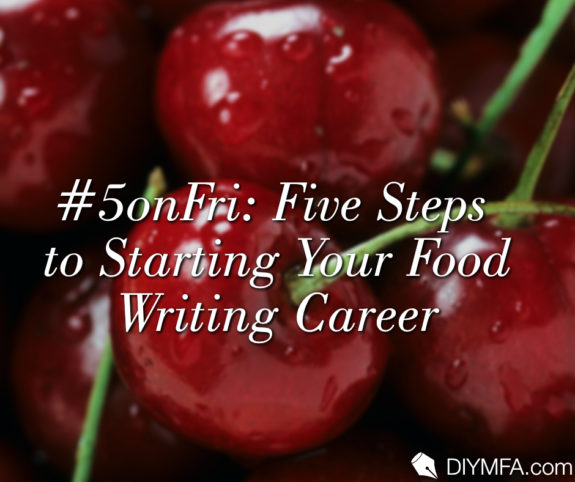So, you want to be a food writer, but don’t know where to start? You’re not alone! Scan the internet, and you’ll find everything from recipe blogs to featured magazine articles on a single ingredient. You may think: I love food, but I’m not “qualified” to write about it.
Good news. You don’t need a culinary degree or global experiences like Anthony Bourdain. Whether you dream of writing a novel or a cookbook, it comes down to what you know and how you show up. With a few guiding principles, you’ll be able to build your expertise and skills and get your food writing career cooking.
1. Start Where You Eat
As the iconic food writer M.F.K. Fisher said: First we eat, then we do everything else. So before you write, dig deeper into what you already love to eat. Do you love sushi and wish you could make the perfect roll? Or are you obsessed with the Lebanese restaurant down the street, but have yet to try the entire menu? Sign up for a cooking class or make it your mission to try every item at your favorite restaurant. And while you’re there, ask how to make things at home or where people are sourcing their ingredients.
If you have a specialty grocery store you frequent, from the cheese counter to the check stand, get to know the staff when you shop. Most valuable question to ask: Have you ever used/ had this before? If they haven’t, they’ll likely ask a fellow team member if they have. And if they’re not a fan, they’ll recommend another option and likely how they use it. It’s a recipe and education gold-mine.
2. Work for Free
Don’t wait for permission to write. If you don’t already have a website, create one with a blog. This will not only give you a space to chronicle your culinary experiences and insights, but will establish your authority within the field. It’s also a way to have writing samples to send to publications. Not sure what your niche is yet? That’s okay. Your point of view will evolve, and over time, your interests will become more and more defined.
While food writing can encompass a variety of mediums, most people start in some form of journalism. When your site is up, reach out to the editor at a local or regional food magazine with links to your work, a little about your experience and where you think your skills could fit in. Even if a magazine doesn’t advertise editorial internships, ask about one. Some publications let interns work remotely and without college credit, which can be ideal if you have another job and aren’t in school.
If a publication doesn’t have any writing internships available, ask if they need a fact-checker. Most magazines require interns to fact-check articles before they write anything, but some don’t have a dedicated fact-checker. Was the restaurant’s signature baklava recipe the owner’s grandma’s or their mother’s? Is that cocktail really made with cane sugar and not simple syrup? Fact-checking makes you investigate even the most seemingly true statements to ensure what the audience is reading is accurate. It’s a valuable skill to make you not only a better writer, but a better reader.
Of course, you don’t have to work for free, but it can create a lower barrier to entry until you build up your portfolio enough to charge what you’re worth.
3. Expand Your Reading List
If you’re not writing or eating, be reading. Not sure where to begin? Grab a city or national food magazine. After you’re done reading, find the masthead at the beginning of the book and look at the list of editors and contributors. Research their names online. They may have published cookbooks or worked at other publications you weren’t familiar with, which creates an automatic reading list.
And food writing doesn’t stop there. From memoirs to cozies (crime fiction light), there are countless options to dive into. If it mentions or revolves around food, it counts. Don’t forget to add some craft books on food writing to hone your skills. Your local library or bookstore can point you in the right direction if you need fresh suggestions or inspiration.
4. Upgrade Your Home Cooking Skills
Forget owning an entire collection of Le Creuset. You can upgrade your experiences in a number of ways. Are you obsessed with chocolate pastries or finding the best Filipino food in the South? Find cookbooks or online recipes to recreate your favorite dishes or to make variations of what you love. From there, you’ll become more bold with what you make and more willing to experiment with new recipes.
Upgrading your spices, oils, fresh meats and produce can make a difference too. Any chef will tell you a dish comes down to the quality of the ingredients. You don’t need to spend your entire paycheck at the store, but by adding the occasional bottle of extra-virgin olive oil or organic cut of beef, your taste buds will open up and make you a more informed writer.
5. Build Your Network
The food world is tiny, so make friends wherever you eat. Most chefs are friends with editors at major publications. The manager at your favorite wine bar may be best friends with an award-winning winemaker across the country. Find local or regional food events to attend. Magazines are adding more revenue for events, so you have the opportunity to network with editors and fellow writers. Also, there are public relations companies dedicated solely to food and beverage, so if you meet one of their agents at an event, get their card. If you wanted to cover one of their clients or collaborate in the future, it’s easier to do so if you’ve met in person.
Become a member of a national or regional culinary organization or volunteer for local charities with an emphasis on food. Editors, chefs and other industry professionals often sit on the advisory boards, making it a rich environment for supporting good causes and relationship building.
If there’s someone you admire and want to reach out to: Do it. People can be surprisingly generous to beginning writers, and they may even say yes to a meeting. With all of your contacts, be kind and supportive of their work too. You’re looking for genuine and long-term relationships, not a stack of business cards you’ll never use.
Whether it’s a meal with your family or a trip to eat your way through Vietnam, the beauty of food writing is it can take you anywhere. The connection food provides to people and their communities is more often than not a universal experience, regardless of where you are in the world. This gives you and your readers constant opportunities to learn. Stay humble and curious, and when in doubt, always be eating.

Amanda Polick is a book coach for food and entertainment professionals based in Nashville, Tennessee. When she’s not eating her way through her newest stack of cookbooks, this former actor and improviser can be found looking for her next favorite performer. Her work has been featured in Cooking Light, Food & Wine, and Time. From developmental editing to emotional support throughout the book writing process, the guiding light of Amanda’s work is connecting people to their best stories. To reach out or learn more, visit her website for free inspiration and book writing guides.







